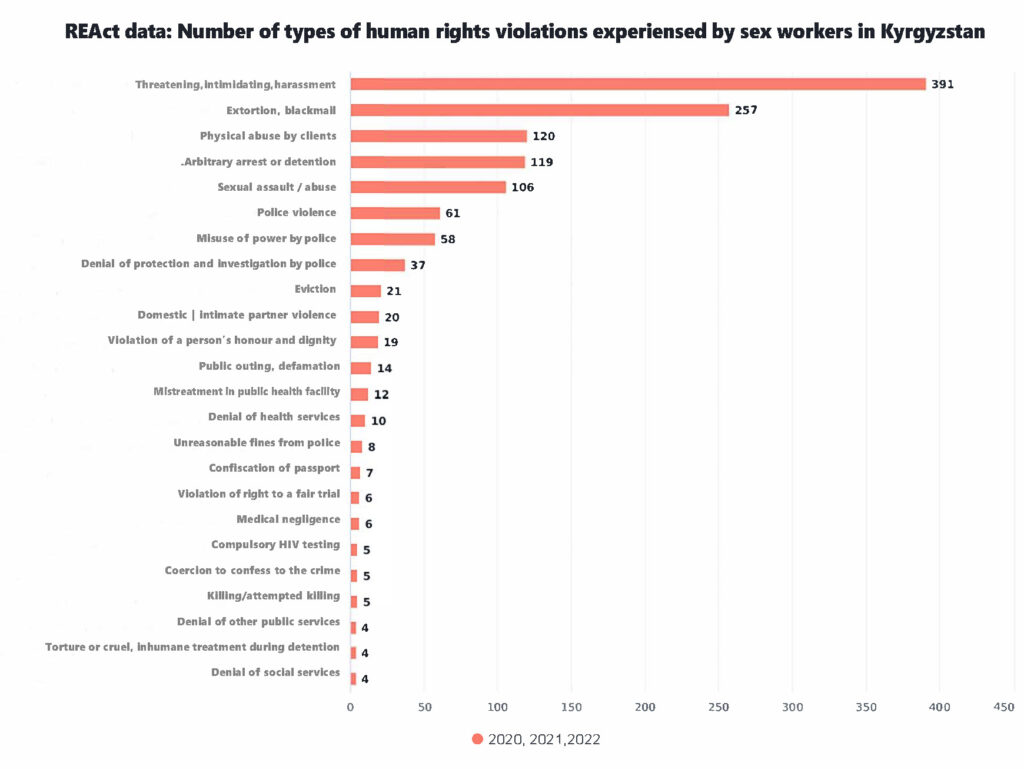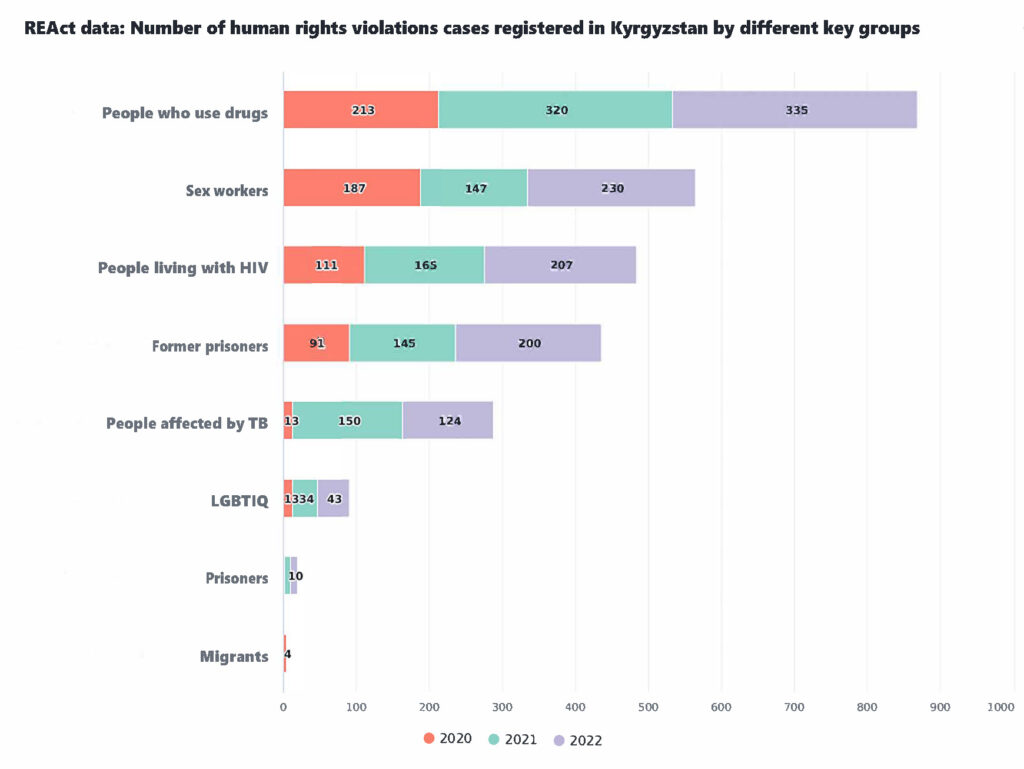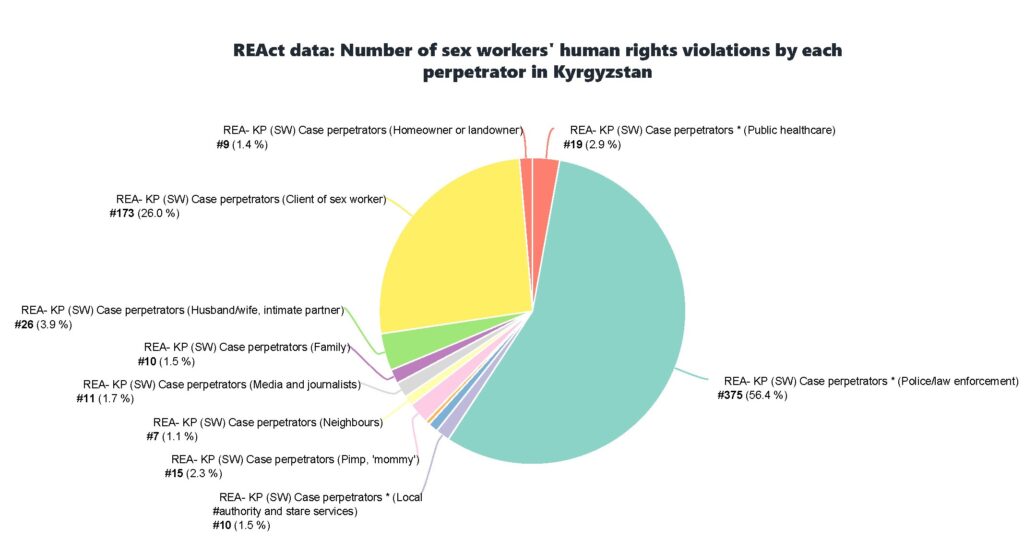Every year on December, 17, sex workers, their advocates, friends, families and allies celebrate the International Day to End Violence against Sex Workers. At first, this date was conceived as a memorial in honor the memory of the victims of the killer from Green River. In the post-Soviet region, it was proposed to celebrate this day by the Sex Workers’ Rights Advocacy Network (SWAN).
REAct will join the Day to End Violence Against Sex Workers events and publish the collected evidence of violations of the rights of this vulnerable group in Kyrgyzstan, the country that managed to record the largest amount of evidence in the EECA region thanks to the effective work of non-governmental organizations and communities. We also publish the story of one of the clients who applied to illustrate the vulnerability and insecurity of sex workers.
Only during the 2020-2022, the REAct system in Kyrgyzstan registered more than 1,300 reports of violations of the rights including representatives of this key group.. More than 50% (668 cases) of registered cases reported violations of rights and discrimination by representatives of law enforcement agencies. Of the 668 cases, 34%of violations were reported by sex workers.
Sex work itself is not criminalized in Kyrgyzstan. However, everything related to it is connected, including the organization, may fall either under the norm of Art. 166 of the Criminal Code of the country – “involvement in prostitution”, or under Art. 167 – “promoting prostitution and debauchery.” Thus, in fact, sex work is criminalized and highly stigmatized. And alas, first of all, by the girls themselves.



For your help you will be punished
January 2022. Nazgul Baidovletova, public defender, «ZiOM21» Public Foundation, Talas (Kyrgyzstan) was approached by Amina (name changed). She and another girl (both sex workers) were beaten by clients. As it later became known, they wanted to rape her friend – Amina stood up for her, for which she paid such a high price…
Nazgul says that she immediately offered to write a statement and see a doctor, but the client refused. The reason for this was … the rapists themselves – it turned out that they were her acquaintances and the girl did not want to create problems and attract too much attention. Only on the third day, when the pain became unbearable, she again dialed the number of the human rights activist. Amina was immediately taken to a friendly doctor. The condition was terrible: bruises all over the body, eyes filled with blood, abdominal pain – he immediately recommended to go to the hospital. Nazgul began to emphasize again that such a case should not be ignored, and that those responsible men should be punished. But again she was refused – it seemed to the client that everything was not so serious and it was not worth exaggerating.
At the hospital, Amina was first seen by a traumatologist, but did not find anything in her profile and was redirected to a gynecologist. Examination and ultrasound in the women’s department gave a disappointing verdict – an urgent operation due to hemorrhage in the uterus. After it, the situation changed – the girl agreed to write a statement, but at the same time she called the offenders, in the hope that they would answer and help. But to no result.
We pay and the case is closed
According to the law, the gynecologist who took Amina signaled to law enforcement agencies that a patient with such a serious diagnosis was admitted, but they were in no hurry to respond. On the same day, Nazgul also applied to the district department of internal organs, but the request remained unanswered. Only the next day the police arrived and accepted the statement from the victim. But at that moment, the rapists got in touch with Amina. Upon learning that the girl turned to the authorities for help, they offered her to pay the costs of the operation if she wrote a counter statement and the case was closed. They began to put pressure on the fact that they are familiar, that they work in such an area … The girl had doubts – is she doing the right thing? As a result, Amina succumbed to their persuasion, accepted the money (the amount of 20 thousand soms, which is similar to 200 dollars) and the issue was closed.
But everything could be different
Obviously, without the intervention of paralegals, the case would not have reached law enforcement at all. However, the situation could have gone in a different, more significant “scenario”. According to the Istanbul Protocol, Kyrgyzstan has developed and implemented the ”Practical Guidelines for Documenting All Types of Violence”, according to which, when contacting a medical institution, any type of violence must be recorded by a doctor in a special form. And if the police representatives immediately responded to the call from the hospital and the appeal of the defender, took the testimony of the victim – for violators it would be a completely different article. Plus, the harm done to the health of the client has not been fully determined. But alas, the moment has passed.
Aisuluu Sharsheeva, mentor of the Street Lawyers project, comments on the situation: “When considering this and other similar situations where sex worker violence occurs, we should not miss an extremely important point – the self-stigma of our clients. Because of it, they are ready to endure pain, just not to go to the doctor, to forgive aggression and humiliation, because “such a category, they can treat us like that.” That is, instead of upholding the rights – in fact, to depend on violators. Girls are really extremely vulnerable, but they should not give up. This category must firmly change its approach, fight for its rights, otherwise everyone will forget about their existence. SWs should be understood and remembered, despite the cruel and inhuman treatment, everyone has the same rights and must be implemented.”
For reference:
REAct in Kyrgyzstan is being implemented in partnership between the Partnership Network Association and the Soros Foundation-Kyrgyzstan. Cases are documented by 15 NGOs that participate in the Street Lawyers project and are located in different cities and regions of the country.
The Street Lawyers initiative was launched in 2016 in response to actual problems of vulnerable groups. Street lawyers are trained employees of non-governmental organizations in Kyrgyzstan, representing and defending the interests of vulnerable groups, key in the context of curbing the HIV epidemic. In the future, street lawyers were renamed “public defenders”.
This project helps people who are in a difficult life situation. Difficulties in obtaining documents, problems with access to medical services, abuse of authority by law enforcement officers are the main of the many barriers faced by representatives of key populations. A successful case is when a person realizes that his violated rights have been restored. He feels like a full citizen. The problem was solved through negotiations and achieve for the client the restoration of his rights. The main task of street lawyers is mediation. Public defenders act as a conductor between the client and government agencies.
Also read:
Unprofessional attitude of medical stuff that brings to the violation of rights
The first judgment for discrimination based on sexual orientation in Bosnia and Herzegovina


